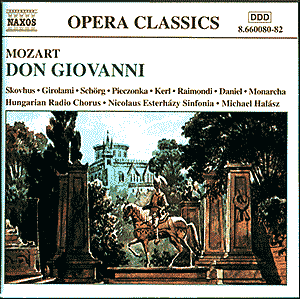This new recording from Naxos gives a glimmer of the
silver lining consumers can enjoy in the current crisis in the classical
recording industry. As the ‘majors’ cut their artist rosters, abort
projected recordings and cancel contracts, it gives smaller companies
a chance to cast some previously exclusive singers of international
renown in their opera recordings. Here we have the Danish baritone Bo
Skovhus in the name part. Ten years or so ago he and others here would
be appearing in complete opera recordings for the likes of Decca, EMI
and RCA, etc. at three times the price of this Naxos issue: a silver
lining in the consumers’ pocket, especially when the results are as
good as this.
Wolfgang Mozart in his all too brief life lived
in constant penury having to seek loans from friends and supporters.
By 1785 he had moved from Salzburg, via Munich to Vienna to enlarge
his opportunities. His strengths as an opera composer were widely recognised
and the genre remained central to his ambitions. In 1786 he commenced
a collaboration with the poet Da Ponte that realised the immensely popular
Le Nozze de Figaro for which he received 400 gulden and Da Ponte
200.
Figaro was a great success in Prague. During
a visit to that city in January 1787, Mozart was commissioned to write
an opera for production the following autumn: the fee was 100 gulden!
Mozart returned to Vienna and although Da Ponte was working on librettos
for two other composers he agreed to set the verses of Don Giovanni
for Mozart. The opera received its première in Prague on 29th
October and was well received.
For the Vienna production of the opera in 1788 there
were problems. The tenor couldn’t sing his Act 2 aria (No. 21) Il
Mio Tesore (CD3 tk.4) and Mozart substituted the aria Dalla sua
pace, better suited to his abilities at No.10 in Act 1. The Elvira
part, sung in Vienna by a protégée of Salieri, demanded
a scena for herself. Mozart added the accompanied recitative and aria
Mi Tradi at No.26. Performance custom in the opera house, and
on record, has varied, with some unhappy attempts to combine the two
versions. This recording uses the Prague version with the major additions
from Vienna added as an appendix (CD3 tks.18-20).
The conductor of this set is Michael Halász.
He has been resident at the Vienna State Opera since 1991 and already
has widely, and justifiably, acclaimed recordings of Fidelio
and Die Zauberflöte for Naxos under his belt. He conducts
a well paced performance with plenty of rhythmic vitality whilst also
allowing his singers space for characterisation and phrasing. Particularly
impressive is his handling of the two concerted act finales; a septet
to Act 1 and sextet to Act 2.
The singers, many with Vienna State Opera connections
are well matched for quality and the men clearly vocally differentiated
for character. The mellifluous tones of Skovhus, with his slightly Germanic
Italian, is easily differentiated from the native Italian Leporello
of Renato Girolami who, whilst not having the beauty of tone of his
master, is the master with the words as is heard in his ‘catalogue’
aria (CD1 tk.10). Particularly welcome is the fact that Skovhus doesn’t
over-point the accents as other famous lieder singers have done in opera
recordings; he lets his voice follow the natural flow of Mozart’s music.
Boaz Daniel has already sung the Don at the Vienna
Volksoper and as Masetto, his steady even tone is welcome. The young
German tenor Torsten Kerl, with a keen edge to his voice is no wimpish
Ottavio. Only in the passagio, the transition from chest to head voice,
does he evince any difficulty with the tessitura.
All the women sing well, although greater differentiation
of voice colour would have been welcome. The Anna of Adrianne Pieczonka,
(a Glynebourne Elvira in 1995) has no trouble with her high lying part.
Regina Schorg is a lightish Elvira with good diction and her Mi Tradi
(CD3 tk.20) lies easily on my ear. The singer who brings a tear to my
eye, by clear tone and elegant phrasing is the Zerlina of Ildiko Raimondi.
Her Batti, batti (CD2 tk.4) is lovely –Strike her? Never!
The November 2000 recording is well set in a natural
airy ambience with a nigh perfect balance between the small orchestra
and the voices. This balance is particularly important in the ensembles
and the engineers are to be congratulated. My only wish is that they
had made the arrival of the Commendatore at Giovanni’s party more immediate
and hence threatening.
This performance and recording stands ahead of many
in the catalogue, even if not supplanting Giulini’s 1959 recording for
EMI, which may never be bettered, but that cost is at full price. The
accompanying booklet has good, brief notes, a track related synopsis
and a libretto but no translation.
Robert J Farr

![]() Bo Skovhus (Don Giovanni),
Renata Girolami (Leporello), Boaz Daniel (Masetto), Janusz Monarcha (Commendatore),
Torsten Kerl (Don Ottavio), Adrianne Pieczonka (Donna Anna), Regina Schörg
(Elvira), Ildiko Raimondi (Zerlina)
Bo Skovhus (Don Giovanni),
Renata Girolami (Leporello), Boaz Daniel (Masetto), Janusz Monarcha (Commendatore),
Torsten Kerl (Don Ottavio), Adrianne Pieczonka (Donna Anna), Regina Schörg
(Elvira), Ildiko Raimondi (Zerlina) ![]() NAXOS 8.660080-82 [CD1
58.31, CD2 58.38, CD3 56.30] Budget price
NAXOS 8.660080-82 [CD1
58.31, CD2 58.38, CD3 56.30] Budget price